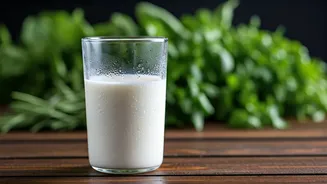Buttermilk: A Refreshing Choice
Buttermilk, often overshadowed, is a nutritional powerhouse. It's more than just a tangy drink; it's a treasure trove of vitamins, minerals, and probiotics
that contribute to overall health. Compared to regular milk, buttermilk presents several advantages, mainly in terms of digestibility and the presence of beneficial bacteria. This beverage is a staple in various cuisines, known for its cooling effect, especially valuable in warmer climates. Understanding the optimal times to drink buttermilk allows you to maximize its health benefits, making it an excellent addition to a balanced diet and a refreshing alternative to other beverages. Its refreshing nature provides an immediate sense of revitalization.
Morning Consumption: Kickstart Digestion
Starting your day with a glass of buttermilk can be particularly beneficial. It helps to kickstart your digestive system, preparing it for the day ahead. The probiotics present in buttermilk aid in maintaining a healthy gut, promoting better nutrient absorption. Drinking buttermilk in the morning can also help to alleviate acidity and heartburn, common issues for many individuals. This early-morning consumption can lead to improved overall digestive health, setting a positive tone for the entire day. The slightly acidic nature of buttermilk helps in stimulating the secretion of digestive juices, which is a great start.
Post-Meal Buttermilk: Digestive Aid
After meals, buttermilk acts as a digestive aid. Its properties help break down food, preventing bloating and discomfort often associated with heavy meals. It's particularly useful after consuming spicy or oily foods, as it soothes the stomach and reduces inflammation. Drinking buttermilk after a meal also promotes better nutrient absorption, ensuring your body utilizes the food effectively. This practice can be especially beneficial for those with sensitive digestive systems, providing relief and preventing potential digestive issues. This makes it an ideal accompaniment for any meal.
Evening Enjoyment: Relaxation and Hydration
Having buttermilk in the evening can promote relaxation and aid in hydration. Its cooling effect can be particularly soothing after a long, tiring day. Drinking buttermilk before bed can help prevent late-night cravings, contributing to better sleep patterns. It helps in maintaining a balanced hydration level overnight, preventing dehydration. Enjoying buttermilk in the evening can be a mindful way to unwind and prepare your body for rest. Additionally, it provides essential nutrients needed for recovery and repair during sleep. This routine helps maintain overall well-being.
Buttermilk vs. Milk
Comparing buttermilk and regular milk reveals some notable differences, mainly regarding lactose content and digestibility. Buttermilk generally contains less lactose than regular milk, making it a better option for those with lactose intolerance. The fermentation process involved in making buttermilk also reduces lactose, simplifying digestion. Additionally, buttermilk is rich in probiotics, which are absent in regular milk. These probiotics contribute to gut health, an aspect that is crucial for overall well-being. Buttermilk's unique nutritional profile and ease of digestion make it a superior choice for many individuals.
Health Benefits Unveiled
Drinking buttermilk every day offers several health benefits. It supports healthy digestion, thanks to its probiotic content, which promotes a balanced gut microbiome. It helps in hydration, maintaining electrolyte balance, especially important during hot weather. Buttermilk is also a good source of calcium, vital for bone health, and can help control blood sugar levels, contributing to the prevention of diabetes. Its low-fat content makes it a heart-friendly choice, reducing the risk of cardiovascular diseases. The regular consumption of buttermilk contributes to improved immunity, providing overall wellness.
Potential Side Effects?
While buttermilk is generally safe for consumption, some potential side effects exist. Individuals with lactose intolerance may experience digestive issues like bloating, gas, or diarrhea if they consume large quantities. Overconsumption can also lead to an imbalance in the gut bacteria, though this is rare. Those with specific health conditions should consult a healthcare professional before including buttermilk in their diet. It is important to pay attention to your body's response, adjusting intake accordingly. For most, buttermilk offers only benefits, but awareness is key.




















